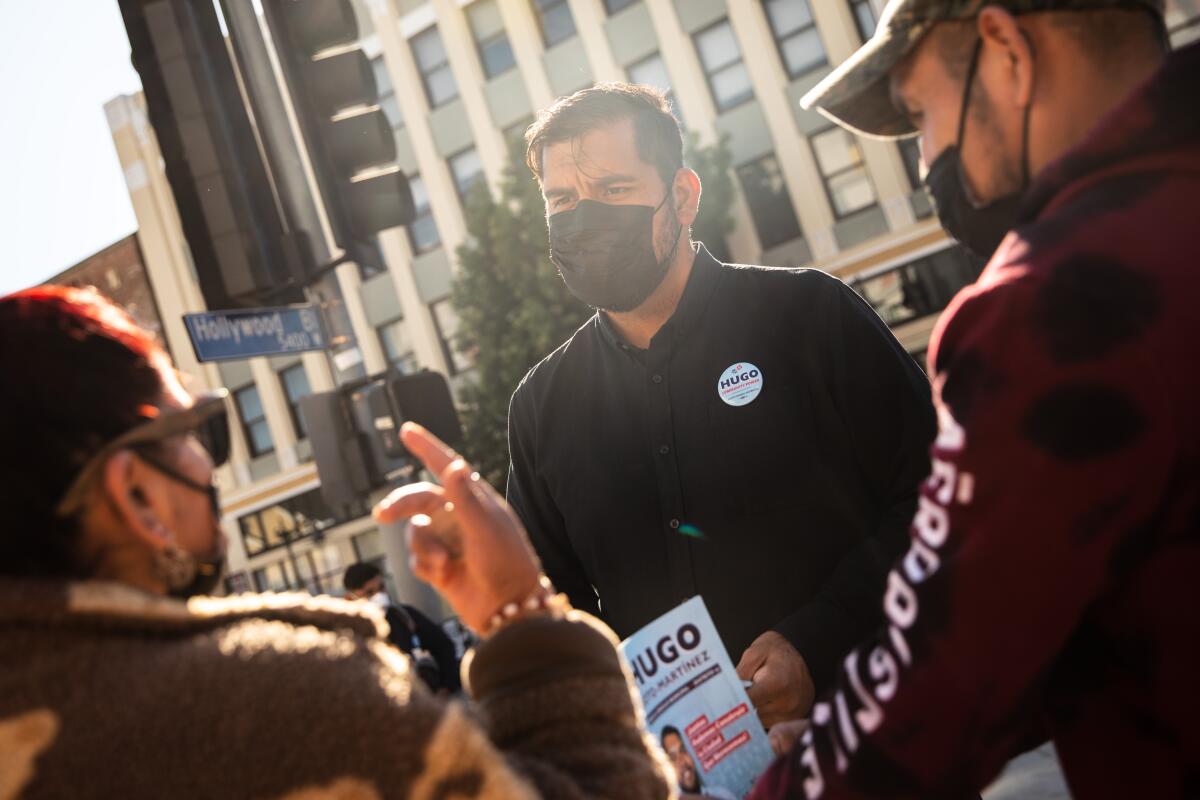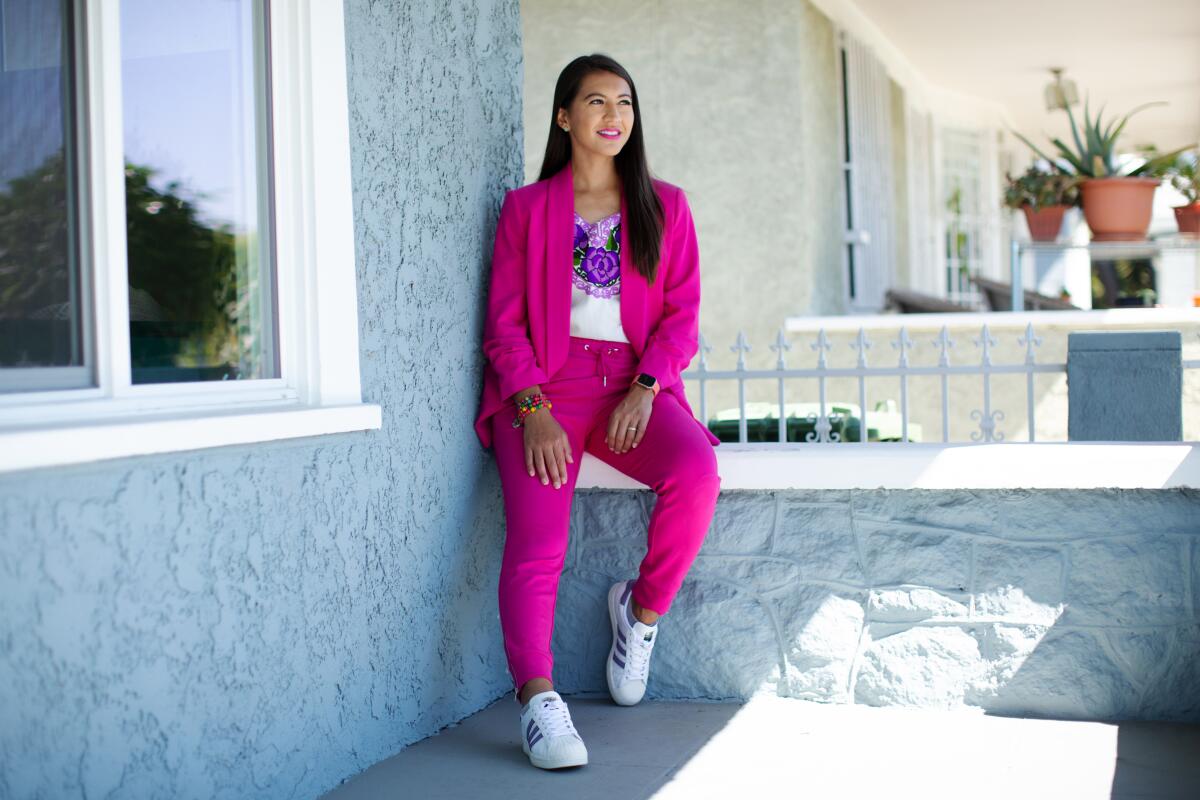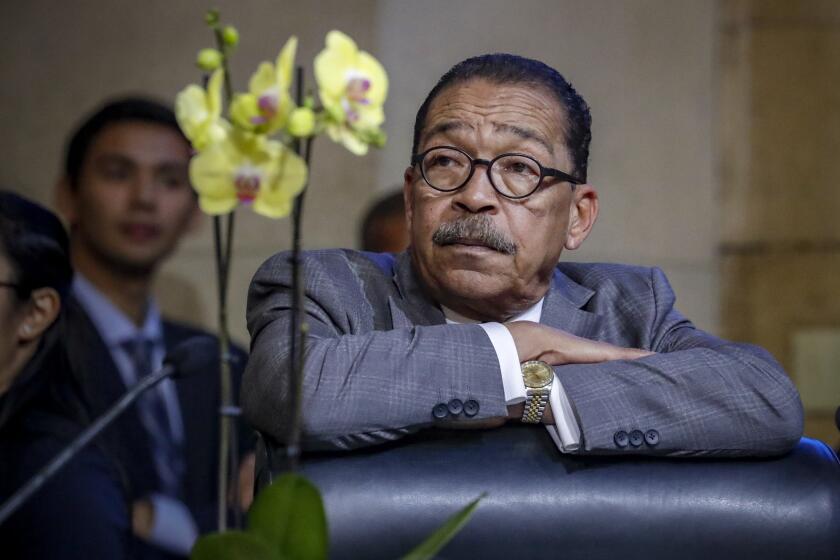Unseating an L.A. City Council incumbent is exceedingly rare. Will it happen in 2022?

- Share via
Two days after losing her bid to unseat Councilman Mitch O’Farrell in 2017, Jessica Salans and a handful of campaign volunteers gathered in a rented office above a Thai restaurant in East Hollywood to regroup.
For the record:
11:43 a.m. March 3, 2022Meghan Choi served as field director for the 2017 Salans campaign, not campaign manager. An earlier version of this story incorrectly spelled her first name as “Megan.”
On a roll of butcher paper, Salans had scrawled a question in bright blue marker: “Where do we go from here?”
By all conventional measures, the campaign had been a failure. With no name recognition, little money and no paid staff, Salans placed third in a primary that O’Farrell won outright with 59% of the vote.
But for young progressives energized by Vermont Sen. Bernie Sanders’ 2016 presidential bid and devastated by Donald Trump’s victory, the Salans campaign had offered an outlet for frustration and a sense of the possible in city politics.
The group soon grew into Ground Game L.A., a grass-roots organization dedicated to building community and electoral power.
Get the lowdown on L.A. politics
Sign up for our L.A. City Hall newsletter to get weekly insights, scoops and analysis.
You may occasionally receive promotional content from the Los Angeles Times.
Three years later, Salans and her volunteer field director, Meghan Choi, helped shepherd urban planner Nithya Raman’s historic victory over Councilman David Ryu as co-campaign managers. This year, Ground Game members are helping lead progressive campaigns challenging incumbents in two City Council districts.
Ousting a City Council incumbent has historically been a little like snow in Los Angeles — not impossible, but exceedingly rare. Competitive challengers are few, and over the last quarter-century only two have succeeded.
But quite a bit has changed in recent years. City elections used to be held in odd-numbered years and typically drew only a small fraction of registered voters. They were moved to even-numbered years in 2020, aligning with national and state races and reshaping the local electorate.
The pandemic and protests around police reform also put klieg lights on city government, making it a focus of new attention for a broad swath of Angelenos.
In the wake of Raman’s 2020 win, some see a shift. Sitting council members will still have strong advantages in the primary, but the near-invincible protection of incumbency may be eroding. Five incumbent council members are up for reelection in 2022 and at least three face potentially competitive races.
“I think it is unusual in the city of L.A. to have this many challengers who are getting the traction that they are. That’s not something we’ve seen historically,” said Tommy Newman, vice president of United Way of Greater Los Angeles.
In the Hollywood-to-Atwater Village district where Salans ran in 2017, O’Farrell is facing more than a half-dozen competitors, including two progressive candidates — former council aide Kate Pynoos and labor leader Hugo Soto-Martínez — who have raised more than $100,000.
Councilman Gil Cedillo, a veteran politician forced into a rare runoff in 2017, is being challenged by community activist Eunisses Hernandez in a district stretching from MacArthur Park to northeast Los Angeles. And in a closely watched race in South L.A., educator Dulce Vasquez is attempting to unseat Councilman Curren Price.
“I think every election going forward is going to be tough,” Price said, citing a number of factors, including turnout and a new generation of voters who want to challenge the system. “It’s not business as usual anymore.”
The power of incumbency typically brings considerable financial advantages and establishment backing to candidates at all levels of government.
In Los Angeles, a century of off-cycle municipal elections and the sheer size of the city’s sprawling council districts fortified officeholders’ positions.
In a majority-minority city where most people rent, the relatively small electorate was older, whiter and more likely to own homes than the city at large.
“In the old days, you had 15% turnout and a candidate could talk to every one of those voters. They were on neighborhood councils and in homeowners associations and it was basically like small-town government,” said Newman, who once worked for the late Councilman Tom LaBonge.
Those same groups — often the loudest, most organized voices on neighborhood-level issues — tended to hold outsize sway with council offices.
Some think the realignment of the election calendar could radically alter the city’s political landscape.
“All these new people are going to be voting — people who’ve historically voted in congressional and state elections who haven’t voted in city elections,” said Pynoos, a former aide to Councilman Mike Bonin running against O’Farrell.
The greater the turnout, the more diverse the electorate is, including younger, more progressive voters, said Fernando Guerra, director of Loyola Marymount University’s Center for the Study of Los Angeles.
“The City Council has always been more conservative than the electorate,” Guerra added, characterizing the old system as a “tremendous” factor in the power of incumbency, whereas the new system “allows for greater challenges.”
But in a political arena where neighborhood-level discourse has typically dominated over big-picture ideology, former L.A. Councilman and county Supervisor Zev Yaroslavsky warned against painting with too broad a brush, particularly in regard to how increased turnout may affect election outcomes.
“The electorate is complicated. ... And in the City Council elections, every district has its own idiosyncratic issues,” Yaroslavsky said.
O’Farrell praised the switch to even-year elections, which he voted for, but characterized evaluations of the electorate as something best left to the pundits.
“I just focus on the work and delivering services as a council member like I always have and focusing on a public service agenda and not a political agenda,” O’Farrell said.
The number of candidates in O’Farrell’s race increases the likelihood that the group will siphon away votes to force the councilman into a November runoff. Albert Corado, a co-founder of the progressive advocacy group People’s City Council, Soto-Martínez and Pynoos are among the other progressive contenders vying for a spot.
Corado’s political career was born out of tragedy: His younger sister Melyda “Mely” Corado was fatally shot by a Los Angeles police officer at the Silver Lake Trader Joe’s where she worked in 2018.
In the rudderless months after his sister’s death, Corado — who is now running on a police abolition platform — began organizing with activist groups such as NOlympics and Street Watch.
Soto-Martínez, whose Prius has a custom “LBRMVMT” license plate, has spent most of his career organizing hotel workers and leading campaigns with Unite Here Local 11. His campaign has five paid staffers, including two field directors who have been active in Ground Game since its inception. Choi, the group’s co-founder, is running Hernandez’s Eastside campaign.
As the only serious candidate challenging Cedillo, Hernandez faces a more difficult climb. It’s likely that she and Cedillo will be the only names on the ballot, meaning the race would be decided in the June primary. Cedillo was endorsed by Bernie Sanders and has long championed immigrant rights.
Hernandez — who co-chaired a successful county ballot measure campaign in 2020 to steer more county money to social services and jail diversion programs — said that more than one local elected official urged her “to be a good girl” and not oppose a longtime councilman who would be unseated in four years by term limits. But she said she didn’t feel that her community could survive another four years of the same.

Challenging Price in a district that includes much of South L.A., Vasquez cited a similar frustration with the status quo. She said she saw Latinos being failed by every level of government during the throes of the pandemic.
“I kept thinking of what my life would be like if I were 12, 13, 14 years old. My mom to this day cleans houses. My dad works in construction. So they would be the essential workers,” said Vasquez, a Mexican immigrant who at one time had been in the country without legal authorization. “I would be at home with [unreliable] internet with my little brother, overseeing his Zoom school too as I’m trying to do my own work.”
That anger was part of what drove her to run.
A judge issues a temporary restraining order barring Wesson from participating as an L.A. council member, handing a victory to allies of Mark Ridley-Thomas.
Price said that as a former community college political science instructor, he welcomed the increased involvement in local politics and even the competition, characterizing it as good for the democratic process.
Like Hernandez and Soto-Martínez, Vasquez is young and digitally savvy, but she is hesitant on the progressive label, saying that though she would probably brand herself that way, her views don’t “fit perfectly squarely in any box.”
Her campaign — which has raised $211,389, more than any other challenger — is being helmed by veteran political firm Bryson Gillette, and one of her early fundraising events was hosted by former Mayor Richard Riordan.
Most of the challengers describe their opponents as too far removed from the struggle and too entrenched in the city establishment.
But outsiderdom is hardly an immutable trait.
Cedillo — who came to the council after a decade in the state Legislature — began his career as a union organizer.
When Price won his first political campaign — an Inglewood City Council race in 1993 — it was at the expense of a three-term incumbent.
Long before he drew the ire of activists, O’Farrell — a gay, Indigenous former cruise ship dancer from rural Oklahoma who spent a decade as a deputy to then-Councilman Eric Garcetti — was a political underdog who won a bruising first campaign where he was vastly outspent by a competitor with powerful backers.
Should any of the challengers succeed, they could find themselves in an unlikely position in four years’ time: running as incumbent members of one of the most powerful local legislative bodies in the country.
More to Read
Sign up for Essential California
The most important California stories and recommendations in your inbox every morning.
You may occasionally receive promotional content from the Los Angeles Times.












